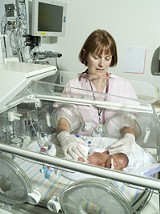[
{
"name": "500x250 Ad",
"insertPoint": "5",
"component": "15667920",
"parentWrapperClass": "",
"requiredCountToDisplay": "1"
}
]
Walking into Strong's neonatal intensive care unit for the first time is overwhelming. It's eerily quiet except for the strange, barely audible sounds babies make yawning. The rooms are dim, even dark in some corners. Incubators not much bigger than a clothes basket are parked along the walls, many of them completely draped in brightly colored blankets donated by volunteers.
Inside are the tiniest of newborns.
The babies who come to this unit, some only hours old and a few inches long, are in such critical condition that they require 24-hour care to survive. Most have been born weeks, sometimes months, premature. One is so small that her father can slip his wedding band over her hand and up to her shoulder.
Such arrivals bring complications: the kind that lead to more complications. Some babies have trouble breathing on their own. Some have gastro-intestinal problems. Some have defective hearts. And there is always the threat of infection.
Strong's neonatal ICU is the only one of its kind in the region. It serves 13 counties --- and metro Buffalo and Syracuse, too, if open-heart surgery is needed. The unit can handle about 70 infants. On the day City was there, there were 48.
The goal for the medical staff in this unit is getting the newborns to artificially complete the time they should have spent in their mothers' womb --- developing to the point where they can breathe without ventilators, digest after feeding, and filter their own blood. Many of these babies weighed only a pound or less at birth. It can take weeks for them just to gain another pound. The job is quite literally getting them to grow.
Lorie Banker, a neonatal nurse for 26 years, graduated from the University of Rochester. After a few months on another floor at Strong, she decided to give the neonatal unit a try. It was, she says, one of the best decisions she has ever made.
Banker and the rest of the team are used to talking in low whispers. Their movements are measured, never sudden. And their workspace is adequate, but not large. It can quickly fill when physicians make rounds.
Computer monitors hover over the incubators, tracking the vital signs of each baby. Stacks of computer equipment sit to the side. Wires seem to swarm around the incubators. And in stark contrast: a small stuffed animal rests on top of one incubator. A blanket with clowns holding balloons covers another.
The mornings begin with a plan for every baby: when to start feeding, what adjustments are needed to the ventilators, what kinds of lab results will be needed for the next day.
This is life as a nurse in an intensive care unit for newborns, in Banker's words:
This one came to us from the Finger Lakes. She was about three months premature. And this little guy was born here. Same thing, very premature. But they are both doing very well. You can see he is up to three pounds now. And the little one over there in the corner: she is still very sick. We have her over in her own little space where it is a little quieter and darker, so she'll feel safe and won't be disturbed. Babies don't breathe while they are in the womb. When they are born, that's when they take their first breath. She wasn't able to make that transition, so we have to support her until she can do it on her own. But she's improving.
Sometimes it's not clear cut. Figuring out what's really going on is not so easy. It may seem like one thing, but then why isn't she responding to this medication? Is something else going on? You're constantly checking and rechecking. But most of them do well.
A lot of them haven't really seen light yet. They're covered, because in a sense they are still in the womb.
They have never gone home. They've never been on their own. And that's our goal: to get them stable enough so they are well enough to go home for the first time. But until then, this is their home. Some are here for a week and some are here for several months.
We are on call day and night, in the sense that this unit is probably the only one in the hospital where parents can come in or call at any time --- 24/7 if they want. If the baby was born in this hospital, the mother might be just down the hall, which is nice. But if the baby was born in another hospital or away from the city, the parents are separated from the baby. And it is very stressful for them.
Some parents are so informed: they call and they clip right through a series of questions, and they want the answers right there. They know exactly what they are talking about. They'll ask about the oxygen rate, what's the blood-to-gas ratio, what's the heart rate, temperature, and so on. Then others simply want to know if everything is still okay. They need reassurance. They are concerned with something they have read or heard. One that called a little while ago is worried that her baby is Down syndrome. The mother that just called wants to know when we will be taking pictures. It's just something we do.
And parents handle it differently --- moms are different than fathers. Mothers have already bonded with their babies. They carried the child and gave birth. Fathers are often a little more detached, but they are sometimes even less able to handle the stress. And it's really difficult to see them go through this. Imagine being far away and trying to handle something like this. You have a job. You may have other children. We have to help them feel secure, that everything that can be done is being done. Everything.
No, it's not any fun being away from your family in the middle of the night, working Christmas or Thanksgiving. But that's nursing. The best thing I like about this job is that we are the ones who really work with the babies.
The physicians we work with on a day-to-day basis --- they are really about the numbers, the chemistry. But we are really the hands-on workers. I could have done so many things over the years, but I just wouldn't ever want to give this up. I could have gone back and become a physician's assistant, because the tuition is covered for us. Or I could have gone into administration. It just depends on what path you wanted. But to be honest, a lot of my friends and girls I started with secretly wish they could have this job. This is really the best job in the place.
The hardest thing is when you are so busy and you just can't do everything to your level of expectation. You want to spend a little more time with each one of them --- whether it's the mother on the phone or this baby over here or whatever it happens to be. There just isn't enough time. You sometimes feel like you couldn't possibly spend enough time with these little sick babies.
And of course the hardest is when you lose one. It doesn't happen as often as one might think. We have come so far from the early days, and we know so much more now than we used to. At one time, more of these babies wouldn't make it. There was a time when doctors didn't believe these babies felt pain, that they weren't developed enough to experience it. And now we know, of course, that isn't true. They do feel pain.
But it is really heart-wrenching when we know that the baby is probably not going to make it. And seeing it struggle through that is so terribly hard on the nurses, on the parents, and, of course, on that little baby. But you learn how to cope with it.
I live in Geneseo, and it's about a 30-minute ride home. And one thing about this is you never ever leave these babies behind. You just never leave them. But the ride really helps me unwind, and by the time I get home I'm feeling more relaxed.
One of the things I really enjoy right now is seeing the new nurses. They come out of orientation, and they are on that floor for the first time, and let me tell you: it's really, really scary. There is just so much to know. And you know you don't remember it all. I still remember my first day, and I thought: Oh, please, please don't give me one with a ventilator. Please, not on my first day.
Latest in News
More by Tim Louis Macaluso
-

RCSD financial crisis builds
Sep 23, 2019 -

RCSD facing spending concerns
Sep 20, 2019 -

Education forum tomorrow night for downtown residents
Sep 17, 2019 - More »






